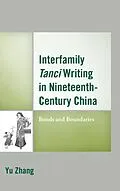Employing an interdisciplinary approach, this is the first monograph to frame three once widely-read tanci fiction (a type of lyrical narrative) from nineteenth-century China, Meng ying yuan (1843), Yu xuan cao (1894), and Jing zhong zhuan (1895), as interrelated texts composed by three generation of members from one extended gentry family in South China. Based on the framework of family bonds, this book uses the three tanci works, authored by a mother, her daughter, and a nephew, to examine the history of how the changing aesthetics of tanci developed over China's turbulent nineteenth century. It also demonstrates how the three writers used the genre of tanci to blur the boundaries of orthodox Confucian norms, in order to depict the evolving nature of gendered power relations at the dawn of China's modernity.
Autorentext
By Yu Zhang
Inhalt
List of Figures
List of Tables
Acknowledgments
List of Abbreviations
Introduction
1. A Case of Interfamily Tanci Reading and Writing: Zheng Zhenhua, Zhou Yingfang, and Judaoren
2. An Alternative Discourse of qing: Zheng Zhenhua and the Legacy of Mudan ting
3. The Daughter's Devotions and Virtues
4. Women and Family: A New Narrative of the Yue Fei Legend in Jing zhong zhuan
5. Nationalist Readings of Jing zhong zhuan in Shifting Historical Contexts
6. Yu xuan cao: Anxiety under Camouflage of Entertainment
Epilogue: The Hopeful Age
Bibliography
About the Author
